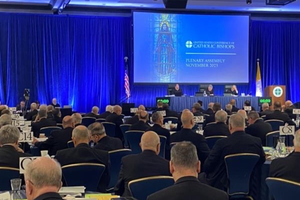US Bishops and Fraternal Unity
EDITORIAL: The cohesiveness the U.S. bishops displayed at their fall assembly played against the prevailing narrative from some Church analysts.

According to some narratives that circulated ahead of the U.S. Conference of Catholic Bishops’ annual fall assembly this month in Baltimore, the meeting was going to be a fractious event where the deep ideological fault lines that supposedly divide our shepherds into warring camps would be on painful display.
It’s satisfying to report that nothing could have been farther from the truth. What was actually on display in Baltimore was the strong fraternal bond that unites America’s Catholic bishops, as they strive to serve their flocks by guiding them in the application of their Christian faith to the myriad challenges of contemporary society.
Analysts who misrepresent the U.S. bishops as a house divided against itself generally make this mistake because they insist on applying a flawed political mode of analysis to Church affairs. Crippled by their own overly politicized perspective, they anticipate that disagreement over how to address hot-button cultural issues like abortion and gender ideology will predominate at every USCCB get-together.
What they fail to understand is that the Church isn’t fundamentally a political institution. So, although its leaders are profoundly interested in political issues because these issues affect the well-being of the suffering humanity the Church exists to serve, this concern is secondary to the attention they devote to even more basic Christian responsibilities: proclaiming to everyone the Gospel message of eternal salvation through Jesus Christ; and forming the Catholic faithful to help others, particularly through loving service to those situated on the peripheries of human life.
Viewed from this foundational religious perspective, the unity exhibited in Baltimore makes perfect sense. Consider the topic that garnered the most attention during the USCCB’s public sessions: the call to mobilize the local Church to tackle the serious mental-health problems that afflict so many Americans these days. Bishop Robert Barron of Winona-Rochester, Minnesota, chairman of the USCCB’s Committee on Laity, Marriage, Family Life and Youth, delivered an update to the assembly, drawing attention to associated problems, such as the pandemic-related personal isolation and misuse of social media that have contributed to a recent spike in feelings of sadness and hopelessness among young people. Bishop Barron also outlined the new mental-health campaign and novena that the USCCB unveiled in October.
His brother bishops responded with a freewheeling and animated discussion, during which they shared personal experiences of dealing with mental-health problems within their own families, as well as at the parish and diocesan level, and by voicing their full-throated support for the new campaign.
Another key topic of discussion at the Nov. 13-16 fall plenary assembly was the National Eucharistic Revival, which is now entering into its third and final year and will culminate in a National Eucharistic Congress next July in Indianapolis. Like the mental-health campaign, this focus on the Eucharist was ill-suited to media exploitation as a divisive issue, so it commanded minimal media attention. But the event is a critically important expression of our identity and mission as Catholic believers, since the central point of the Revival is to refocus the attention of all of the faithful on their personal encounter with Jesus in the Eucharist — an encounter that the Second Vatican Council described as “the source and summit of the Christian life.”
Even when it came to the one agenda item that could have provided an opening for the predicted episcopal discord, the bishops disappointed the analysts. Instead of provoking heated debate, language in a new introductory letter accompanying the U.S. bishops’ voting guide, stating that opposition to abortion remains “our preeminent issue of concern,” was overwhelmingly endorsed after only a brief discussion by a vote of 225-11, with seven abstentions. Similar unity was manifested in the outcome of every other issue that came up for a vote.
Some might argue that there was likely more debate, and possibly disunity, when the bishops met behind closed doors, yet their public votes didn’t reflect any major divides. None of this is to say that the U.S. bishops are going to be solidly in agreement on every issue that comes before them, nor that we should expect or desire that sort of lockstep unity from our shepherds. But, as Mark Twain might put it, the Baltimore gathering proved once again that reports of their disunity are greatly exaggerated.
- Keywords:
- usccb
- fraternity
- u.s. bishops
















